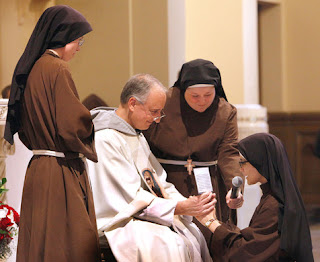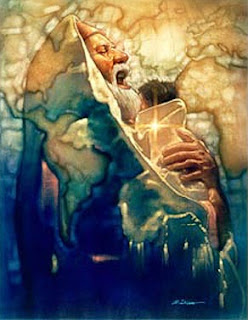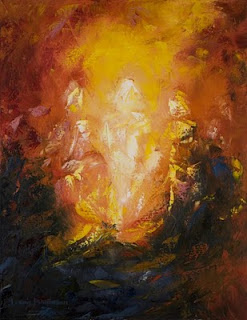Thanks for continuing the conversation and for taking it further than the original poster did. As you will no doubt guess, I am going to disagree with your position, not only because I differ somewhat (mainly in emphasis) on your understanding of hermit life but more, because I think you and I have different notions of independence.
In the first place, I don't think of a hermit as one who leaves everything and everyone "in order to be alone". I think of a hermit as having done these things to seek and live in communion with God and, therefore, to be the truest and fullest Self s/he can be. The purpose of the life is not about being alone, nor about being hidden, or poor, or any number of other things; the purpose of the life is to put God first, to allow God's will to love us fully and unconditionally to be realized in our one very singular and infinitely precious life. Yes, this will mean being alone, poor, hidden, chaste, celibate, and any number of other things, but all of those serve this foundational purpose; they must not be mistaken for it. There is a second half to this foundational purpose, namely, in real ways the hermit leaves everything and everyone and seeks to live in Communion with God and to become and be the truest, fullest, self she can be for the sake of others.
Hermits are, first and foremost witnesses (martyrs) to the Love of God that is the deepest need of and sufficient for every person. We "leave everything and everyone" to the extent and in the way we do so in order to live in the silence of solitude (life with God alone) so that others may also know that God alone is enough (i.e., only God can create, sustain, and complete us as persons). I want to be clear that hermits are not the only ones who witness to this truth; for instance, men and women religious also do so, but they image the way that occurs in community and hermits image this truth in the vividness of the silence of solitude. (Both hermits and cenobites live community, silence, and solitude, but they do so differently with different emphases in their lives.) Again, who the hermit is and what the hermit does, is meant to be a gift and ministry to and for the sake of others; she lives her life for the sake of others -- beginning with God's own sake.So, with that important piece in place let's think about the term independence and especially its sense in Christian theology. To be truly free is to be empowered to be the person God wills us to be. It is to be able to live authentically and fully, the potential which is ours by virtue of our creation by God. There is a "free from" dimension to this empowerment as well as a "free for" dimension. For the person who exists in and through God in Christ, and to the extent this is true, there is freedom from sin (that is, from estrangement from God, self, and others), from ego, from much of the woundedness our lives in space and time cause us. This means too then, that there is the freedom to be Oneself for God, for the sake of God's good creation, and certainly for the sake of all who are precious to God. The hermit's freedom is very much this kind of freedom in both senses and dimensions.
If what one calls independence is ruled by ego, it is not genuine freedom. If we are not free to receive our lives as gift or others in a similar way, we do not know genuine freedom. If we are not free to give ourselves generously, to love and trust others in ways that empower them similarly, we are not truly free at all. Because we are only human as part of a community, because our humanity is a gift of God which is realized in and through our love of God and others and theirs of/for us, we need these same others if we are to be free. God is a community of love and God wills to draw us into that same reality; indeed, he has made us for this. By definition, humanity itself, and human freedom therefore is defined in terms of such community.All of this makes the solitude of the authentic hermit incredibly paradoxical. To the degree it is genuine, it will be an expression of our seeking and being in intimate community with God, with our deepest selves, and, in other ways, with others. No matter what else we walk away from, we cannot walk away from God or our deepest selves without betraying the very nature of our existence as human, and too then, our vocation and its solitude in the process. By extension, we cannot walk away from others --- though most of the time we relate to them differently than most people do.
The vocation I have begun describing here is both difficult, rare, and, as noted, incredibly paradoxical. It is easy to mistake it for the isolation and misanthropy that marks the loner in today's society because externally these two can look a lot alike. When one doesn't know that (seeking and receiving) communion with God is the primary motivation and goal of the hermit, it is easy to imagine that the vaunted "eremitical freedom" means the freedom to walk away from every relationship and responsibility and do whatever one wants whenever one wants to do it. Adding to the confusion is the fact that the word "hermit" has been used in these two antithetical ways, again based on some externals alone. But authentic eremitical life is demanding, and because communion with God (being loved and loving in return in the way God loves and empowers one to love) is a difficult goal which requires the whole of one's life, it really does require supervision and work with a skilled spiritual director, etc., to keep one moving forward in receiving and embodying one's deepest truth.Sin is, in the way I have defined it above, easy; refusing Life, which is always a gift of God, allowing it to slip away, choosing counterfeits and substitutes is easy. Holiness (being true to God and to one's deepest self in order to love as God loves), requires discipline, patience, commitment, and love --- including the love of those who know us and God, and who can help empower us to choose and continue to receive Life at every turn. In my own life those persons are a rare and precious gift. They include those who have agreed to serve me as spiritual director, as well as Director or delegate on behalf of my bishop and diocese to be sure that this vocation is lived well and in a way which is edifying to the life of the church and the understanding of all the faithful.




.jpg)









.jpg)






.jpg)

















































